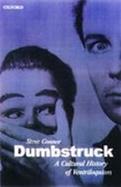Connor follows his subject from its early beginnings in ancient Israel and Greece, through the outcries of early Christian writers against the unholy (and, they believed, obscenely produced) practices of pagan divination. Surprisingly, he finds that women like the sibyls of Delphi were the key voices in these male-dominated times. Connor then turns to the aberrations of the voice in mysticism, witchcraft and possession, and the strange cultural obsession with the vagrant figure of the ventriloquist, newly conceived as male rather than female, that flourished during the Enlightenment. He retells the stories of some of the most popular and versatile ventriloquists and polyphonists of the nineteenth century, and investigates the survival of ventriloquial delusions and desires in spiritualism and the 'vocalic uncanny' of technologies like the telephone, radio, film, and the internet.
Brimming with anecdote and insight, Dumbstruck is a provocative and virtuosic reflection on the problems and astonishments, the raptures and absurdities of theunhoused voice.


